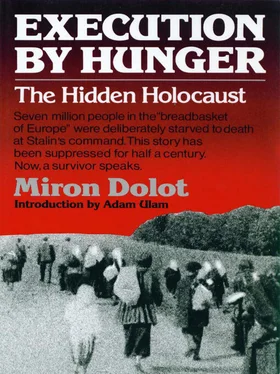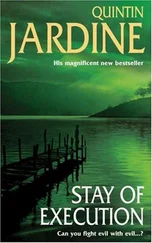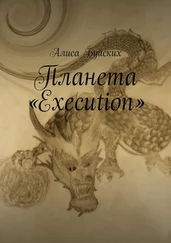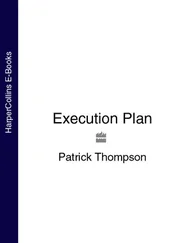Mother rose to her feet and brushed back her hair.
“Before you start your official business, whatever it is, I demand a warrant for the arrest of my son,” she said in a clear voice. We were all amazed.
“I’m only a helpless widow,” she continued. “You can do what you want with me, for I do not have any strength to defend myself. But as long as I am alive, I protest against your intrusion into my house.”
Such a protestation was unheard of. The punishment for saying such things was a sentence of life imprisonment or death. No one would even think of demanding permission for arrest or search from an official.
Mother’s demand touched off hysterical laughter from Comrade Khizhniak and his lieutenants. Then he moved closer to us.
“Look, sister, don’t try to scare me. No one can scare me. I’ve been in tight spots before…”
When Mother tried to say something, he interrupted her. He hinted that he knew what had happened to her husband, and that it would be no trouble to do the same thing to her.
“I know what you mean,” Mother said, without changing the tone of her voice. “Nevertheless, as a citizen, I demand justice and my rights.”
“Now,” he pointed the gun at us: “Now, most loyal and patriotic citizen, you are under arrest. You, too!” He pointed at me with the gun, laughing. We were ordered to turn toward the wall and stand there.
The commission started its official business of searching for something. Comrade Khizhniak, still playing with his gun, seemed to like his business very much. He even looked inside the stove.
After they finished their search in the storage room, Comrade Khizhniak went into the room where Mother kept her clothing and relics in a locked trunk. We soon heard a shot.
Mother and I ran into the room. Comrade Khizhniak was opening the trunk. Not bothering to ask for the key, he destroyed the lock. Mykola, my younger brother, was crying in the corner behind the bed.
As Mother and I appeared on the threshold of the room, Khizhniak raised his gun and fired it over our heads. “Stay in your place,” he ordered. We left, and he closed the door behind us.
After a while, Comrade Khizhniak came out. In one hand he held a book, in the other, jewels—if this is the right word for the keepsakes of a farm woman. They were mementos of my mother’s girlhood.
“Well, Comrade Citizen, will you kindly explain to me what these mean?”
Mother answered; “The book is the Bible and those things are just what you see.”
“From whom were you hiding them?” He pointed to his findings. “How did you come by these things?”
“You know those things are mine!” Mother answered angrily.
In vain she tried to explain to him that the Bible had not been hidden; that she had had the jewelry for a long time, from before the revolution, and that in her own house she did not have to hide her own belongings.
“The Bible,” Khizhniak said, “had been hidden with the purpose of propagating religion, and the jewels did not belong to you, but to your in-laws. A kurkul will always be a kurkul,” he proclaimed meaningfully.
Then he explained that all three of my uncles had been declared kurkuls and arrested. Tomorrow they would be banished from the village and their property expropriated. The commission’s “business” in our house was to find anything that my uncles might have hidden in our home. After a thorough search, the commission left.
Confused and frightened, our only thoughts were of Serhiy and our three uncles.
THE NEWS of the arrest of my uncles was a powerful blow. Since the death of my father, they had been our benefactors and protectors. They had helped support us materially, and had taken a keen interest in our welfare. Now we heard that they might be banished from the village, and sent to a distant region. We couldn’t understand why such industrious, generous, and upright members of our village would be so treated.
All three of them were farmers. They tilled their fields of fifteen to twenty acres, and managed their households as well as conditions permitted. Only one, Havrylo, seemed to be more prosperous than many other villagers. His house was roofed with tin, a sign of prosperity; he also owned several small auxiliary buildings, and a well-cultivated orchard. These gave the impression that he was a rich man. Yet, he had little more land than the other villagers: skillful management and industry accounted for his prosperity. Following the annual harvest, he worked on the railroad or at highway construction to help support his family.
My other two uncles were also ordinary small farmers. Their thatched-roofed houses and several domestic animals were their only worldly possessions. They and their children went barefoot; their diet consisted of bread and potatoes; and they could not always afford kerosene for their lamps. They did not have the means nor the need to hire workers.
Notwithstanding such evidence of poverty, my three uncles were officially labeled kurkuls and were to be banished from the village. For this reason the commission officials had rummaged through our house, examining every little thing from scraps of paper to pots in the oven. They had been looking for my uncles’ valuables. While doing this, they had amused themselves as if they had been performing some heroic deed.
After the commission left, we were allowed to remain at home and were no longer under arrest. However, we could not stay at home, not knowing what had happened to Serhiy and to our three uncles. We assumed Serhiy was in jail. But then he could have been killed on the way or sent immediately to the county center.
Thus it was with our uncles also. We were told that they were about to be banished from the village. But what actually had happened to them, we did not know. We could not help them, but we also could not give up trying.
When Mother and I left the house, the day had already begun to dawn. A dull light appeared on the gray horizon.
Since Uncle Arsin lived closest to us, we decided to visit him first. But when we reached his house, it was already too late; the house was locked and sealed. An armed guard stood at the gate. He informed us that our uncle, his wife, two daughters and son, had been arrested and taken away to the village soviet. They had been allowed to take only the clothing they were wearing.
We decided to follow them, but as we turned back toward the center of the village, a sudden cry—“Help! Help!”—broke the morning stillness. The cry came from the house of an old man, our distant relative, Aleka. Leaving Mother behind, I turned from the road and dashed to his house.
Aleka was a poor farmer who lived alone. Once he had owned a few acres of land and a couple of domestic animals. His wife had died long ago, and his children were married and lived in other villages. But he differed from other villagers because once he had operated a little retail store from his house. His business was only bartering, and we knew that his income was quite meager.
Recently he had sold his store and joined the collective farm. We thought that his age had led him to give up his business, but the officials claimed that he was now trying to cover his past “capitalist activity” and avoid expropriation of his property. They also suspected that he had hoarded a huge sum of money.
When I reached his house, I was not surprised to meet the commission that had left us so recently. The door was open and a few members of the commission were huddled in the entrance hall. The door to the living room was also open.
On the floor lay Aleka, half-naked, vigorously defending himself. A few members of the commission, swearing and shouting, were subduing him. One man pressed his head to the floor; two held his hands; and two struggled with his feet; while another attempted to pull off his boots. There was no doubt that they were after his money. The old man, with surprising strength, fought like a stag against a pack of hounds.
Читать дальше












